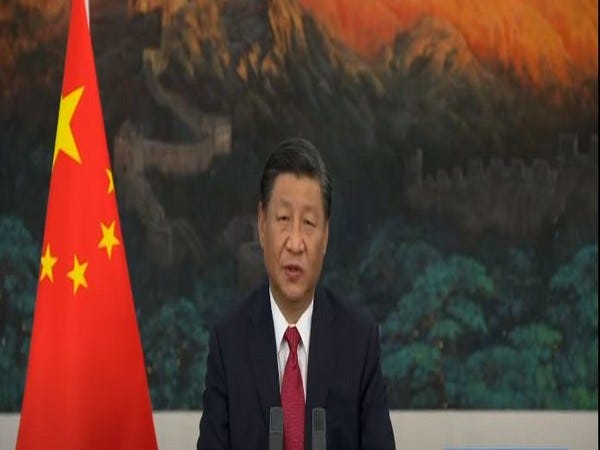Xi Jinping & authoritarian Chinese politics
The human rights situation in China has deteriorated under Xi Jinping, with increased attacks on activists, lawyers, and journalists.
Beijing [China]: Since taking office, Chinese President Xi Jinping has implemented a number of measures to enforce discipline among cadres, as well as populist measures to crush any form of dissent and garner support for his authoritarian policies.
Xi’s far-reaching anti-corruption campaign had targeted his political rivals as well as retired several leaders of the Chinese Communist Party. Brijeshwar Dahiya wrote in the Organisation for Research on China and Asia that the anti-graft campaign became Xi's trademark as a tough leader.
According to political scientists Brian Lai and Dan Slater, Xi is distinguished by an autocratic dictatorship by a leader, as opposed to juntas or oligarchic dictatorships.
Following Xi's election as General Secretary of the Chinese Communist Party, internet censorship in China has increased significantly. Invoking "internet sovereignty," Xi Jinping's regime has imposed stringent restrictions on internet use. China has censored the use of international platforms such as Google, Facebook, and Wikipedia.
The Chinese government passed a law in 2013 prohibiting bloggers from sharing 'defamatory' content on popular Chinese social media platforms such as Weibo and WeChat, a violation of which will result in three years in prison.
Observers have noticed an increase in human rights violations under Xi Jinping's rule, particularly in autonomous and ethnic minority regions, such as mass surveillance and the detention of Uyghur Muslims in Xinjiang.
Xi's target is not only ethnic minorities, but also Hong Kong. Under the principle of "One Country, Two Systems," his administration is systematically destroying Hong Kong's autonomy.
The human rights situation in China has deteriorated under Xi Jinping, with increased attacks on activists, lawyers, and journalists. Hundreds of activists have been arrested, including New Citizens Movement activist Xu Zhiyong.
Religion, according to the author, is a threat to the CCP's authority. They have attempted to restrict Tibetan and Uyghur religious freedom. Xi Jinping's regime uses various methods, including the destruction of religious monuments and the placement of Xi Jinping banners in Uyghur mosques and Tibetan monasteries.
In 2017, the CPC attacked hundreds of Tibetan Buddhist monasteries, including the Larung Gar. In January, the Chinese Communist Party demolished a 99-foot-tall statue in Drago county, Tibetan Autonomous Prefecture, as well as 45 traditional prayer wheels used by Tibetan pilgrims and other worshippers.
Xi has positioned himself not only as a strong leader at home, but also on the global stage. The people of republic China had pursued an assertive foreign policy under the leadership of the Chinese President.
According to Dahiya, China has become more aggressive, even violent, in asserting territorial claims on its neighbours such as India, Japan, and Southeast Asian countries.
Recently, the number of incursions into Taiwanese airspace has increased, particularly in 2020-2021, when Taiwan reported 969 incursions into its Air Defence Identification Zone (ADIZ).
If "peaceful efforts" fail, the PRC government under Xi has been alarmingly vocal about the possibility of using force to occupy Taiwan. (ANI)



